Bosch Dishwasher Making Noise? Here’s How To Put A Lid On It
Bosch dishwashers are great for making our lives easier, but sometimes they can be a bit noisy.
Don’t worry, though – that random rattling noise you’re hearing from your washer isn’t from some critter scurrying inside it.
Sometimes the noise simply comes from stuff like water circulation or improper leveling. Other times, it could be something more concerning like a faulty motor.
In this blog, I’ll explain the reasons for your Bosch Dishwasher Making Noise and help you figure out how to get rid of it.
So, what’re you waiting for? Let’s get started.
Is It Common For Bosch Dishwashers To Make Noise?
Yes, it’s very common for Bosch dishwashers or even dishwashers in general to make some noise during their operation.
However, there are certain noises that may indicate a problem. I’ll talk about both normal and problematic noises, so you can differentiate between them.
Bosch Dishwasher Making Noise: Causes And Solutions
Now, let’s show you what you can do to calm your dishwasher down.
1. Dishwasher Making Beeping Noise
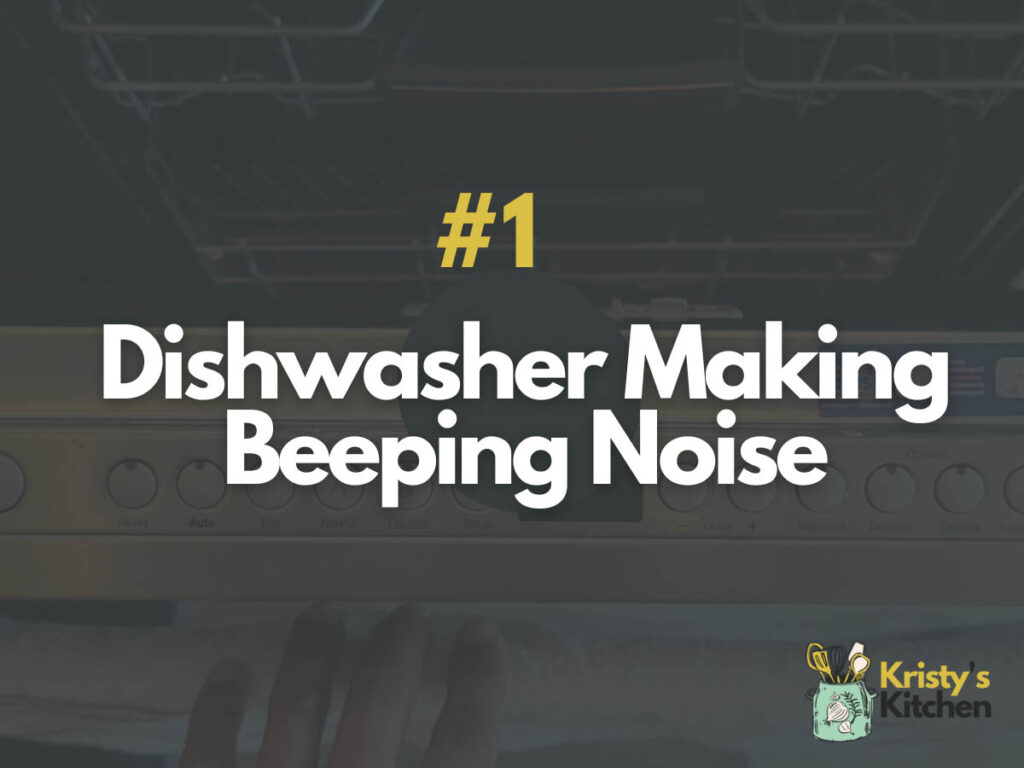
It can be frustrating when your dishwasher is making beeping noises but won’t turn on or if you notice the noise with no lights turning on.
The washer can make beeping noises due to an issue with the control panel or a malfunctioning component.
Step By Step Fix For The Beeping Noise
Here’s how to get rid of the beeping:
- Check if any buttons on the control panel are stuck or pressed down.
- Release them if necessary.
- Try resetting the dishwasher by turning it off and unplugging it for a few minutes.
- Plug it back in and see if the beeping persists.
- Open the dishwasher’s door and inspect the control panel for any loose or damaged connections.
- If that’s the case, let a technician take a look at the interior components and see if there’s any replacement or repair needed.
- You can also try performing a soft reset by holding down the power button for several seconds.
2. Dishwasher Making Grinding Noise
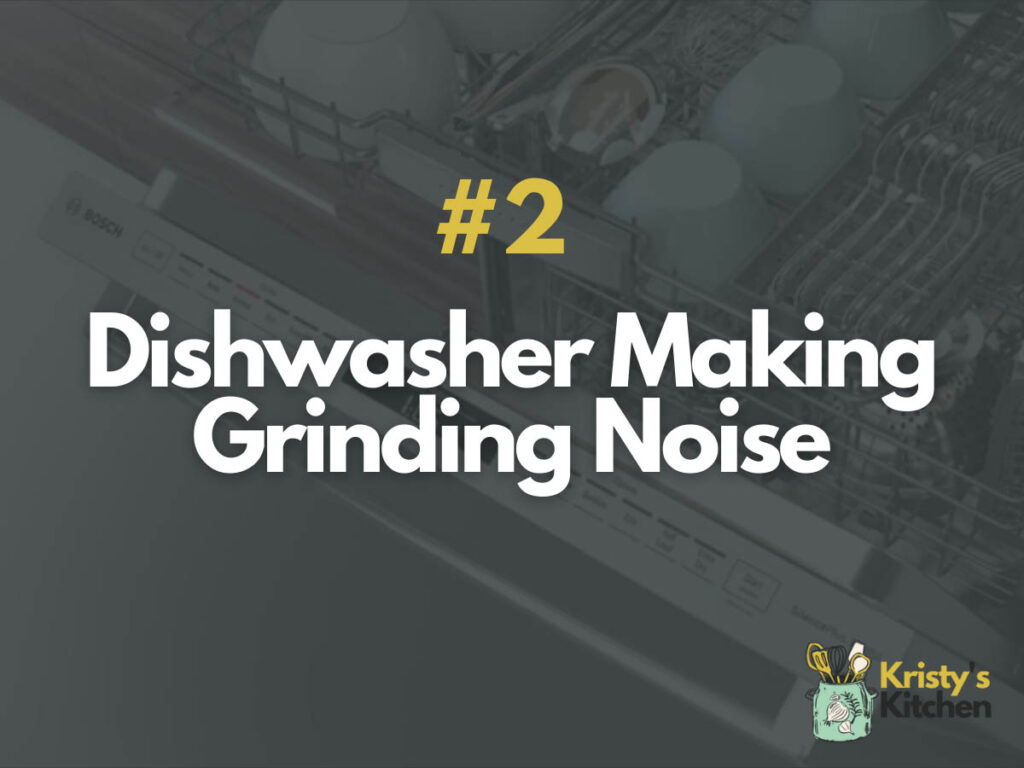
A grinding noise during the wash cycle can be caused by an obstruction in the impeller or a faulty motor.
It’s also pretty normal to hear a grinding noise when water circulates.
Step By Step Fix For Grinding Noise
Here’s how to make this weird noise go away, or at least reduce it so you don’t get more than the normal amount:
- Turn off the dishwasher and inspect the spray arms, filters, and drain for any debris or foreign objects.
- Clean or remove them to ensure proper water circulation and drainage.
- Be sure to turn off the dishwasher and disconnect it from the power supply before attempting the next step.
- If you suspect an obstruction in the impeller, you can try accessing it by removing the spray arms and filters.
- Remove any debris and reassemble the parts.
- Sometimes, hard objects like small bones or glass pieces can get stuck in the dishwasher’s pump. If you can access the pump easily, check for any obstructions and remove them carefully.
- If the grinding noise continues, it may indicate a problem with the dishwasher’s motor or pump. You might need to get it replaced or repaired by a professional.
3. Dishwasher Making Buzzing Noise
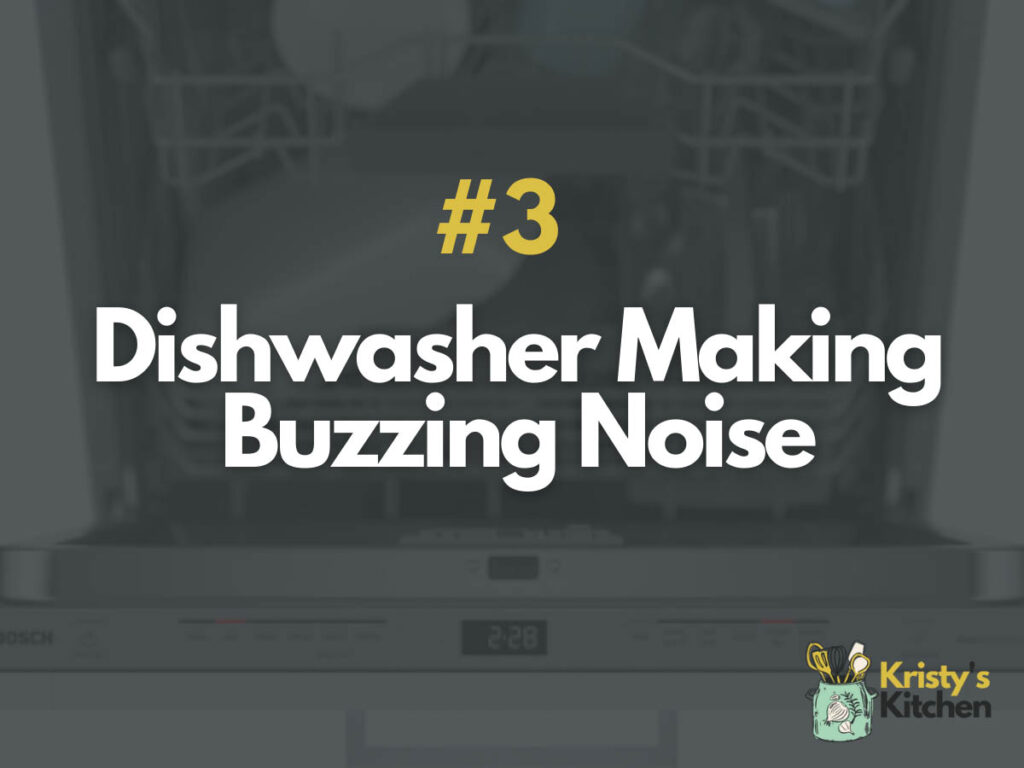
A buzzing noise can indicate a malfunctioning component such as a faulty motor, pump, or solenoid.
The dishwasher can also buzz slightly when it’s filling or draining.
Step By Step Fix For Buzzing Noise
Here’s how to make the washer quieter:
- Check if there are any items or debris obstructing the spray arms or the dishwasher’s interior.
- Clear any obstructions to ensure proper water flow.
- If the buzzing noise is coming from the water inlet valve area, you can try cleaning or replacing the valve. Turn off the dishwasher and disconnect it from the power supply before attempting this.
- If the buzzing noise is still annoying and hardly tolerable, you should get a technician to diagnose and repair the faulty component.
4. Dishwasher Making Humming Noise
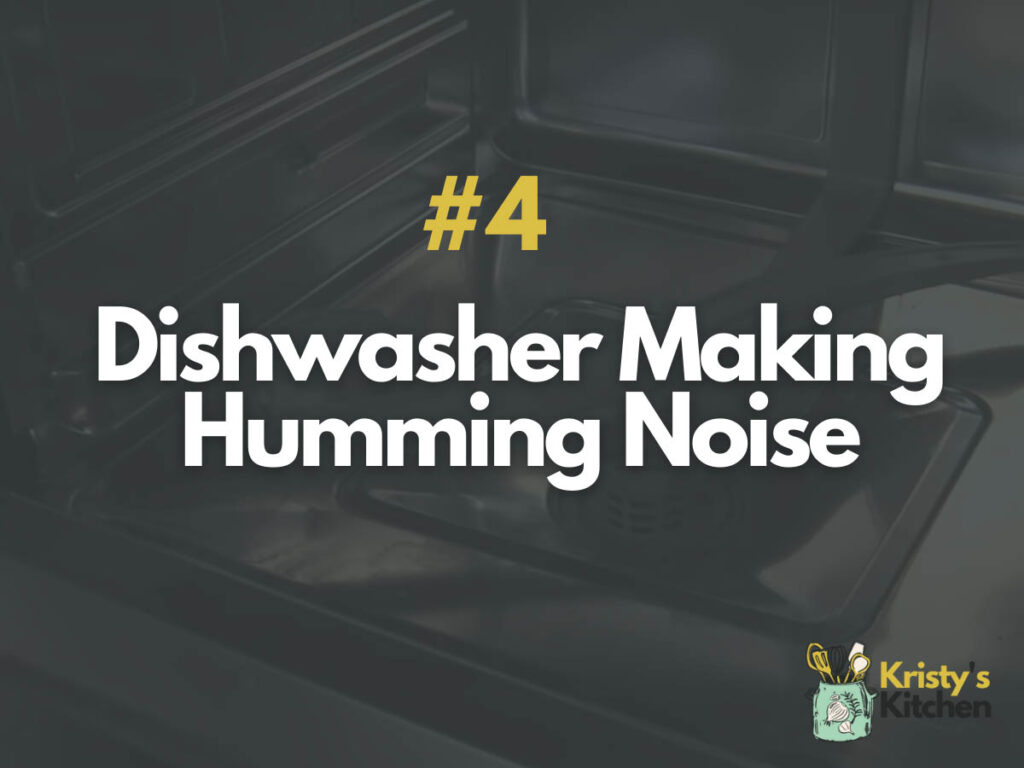
A humming noise at the beginning of the cycle often indicates water filling or circulating. It’s normal to hear some noise during this stage.
Step By Step Fix For Humming Nioise
Here’s what you need to do:
- Turn off the dishwasher and inspect the spray arms, filters, and drain for any clogs or obstructions.
- Clean or remove them as necessary to ensure proper water flow.
- Make sure the dishwasher is properly leveled to minimize vibrations or uneven operation.
- If the humming noise persists or becomes louder, it may indicate a problem with the dishwasher’s motor or pump.
- Inspect the motor and pump area and check for any visible issues like loose connections or damaged parts.
However, if you’re unsure or uncomfortable doing the last step, you should get a technician for further diagnosis and repair.
5. Dishwasher Making Pitched Noise
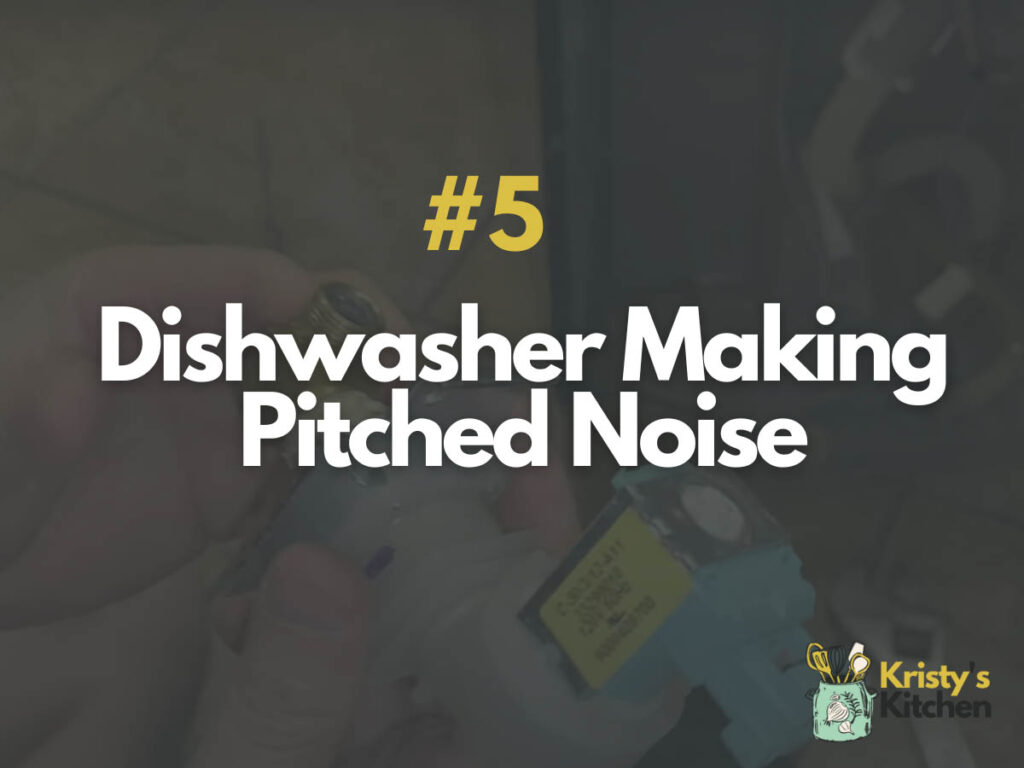
A high-pitched noise during operation can be caused by issues with the water inlet valve or a faulty motor.
You may notice the pitched noise when the dishwasher is filling or draining.
Step By Step Fix For Pitched Noise
You can get rid of the noise this way:
- Check if the water inlet valve is fully open and not restricted.
- Ensure the water supply to the dishwasher is adequate.
- Inspect the spray arms, filters, and drain for any obstructions or debris. Clean or remove them to ensure proper water flow.
- If you suspect an issue with the water inlet valve, you can attempt to clean or replace it.
- Turn off the dishwasher and disconnect it from the power supply before attempting this.
- If the pitched noise persists, it may indicate a problem with the dishwasher’s motor. You can try accessing the motor and checking for any visible issues like loose connections or damaged parts.
- If you spot any of that, go get the washer checked at a service shop.
6. Dishwasher Making Banging Or Thumping Noise
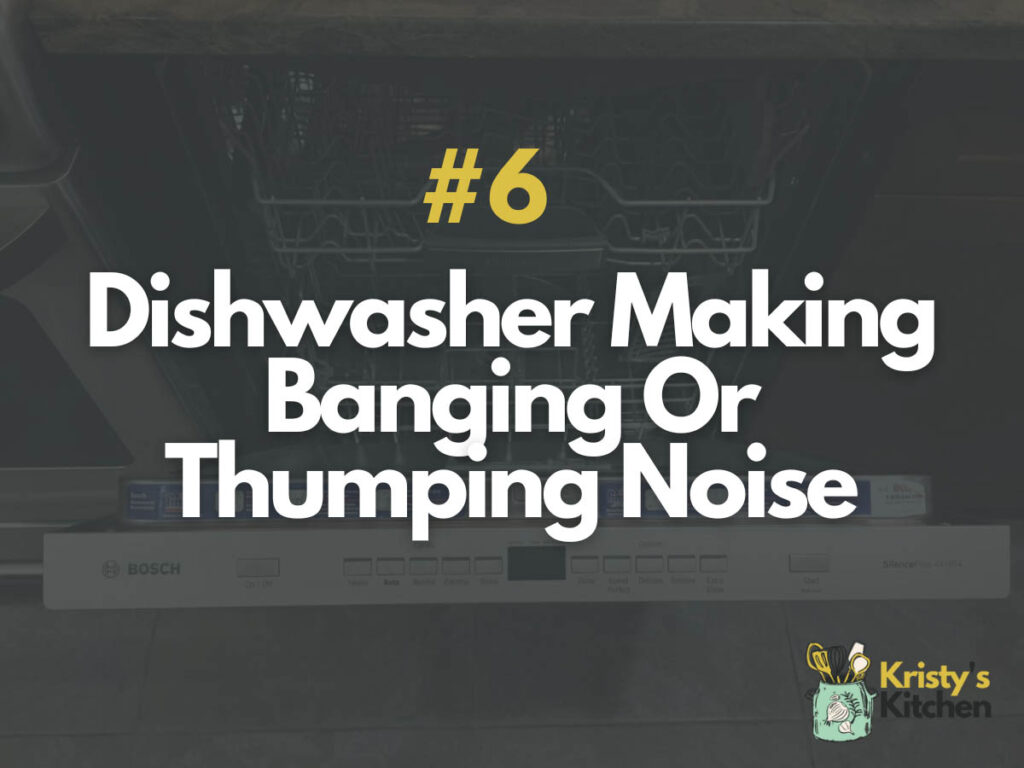
Banging or thumping noises can occur when items inside the dishwasher are hitting against each other or the dishwasher’s interior.
It may also indicate a problem with the dishwasher’s suspension or mounting brackets.
Step By Step Fix For Banging And Thumping Noise
Don’t worry, taking care of this is a fairly easy task – it should be gone with the first few steps. Here’s what you need to do:
- Open the dishwasher and rearrange the dishes to ensure they are properly loaded and securely placed, preventing them from clashing during the wash cycle.
- Check that the spray arms are not obstructed and can rotate freely without hitting any objects.
- See if the dishwasher is properly leveled.
- Adjust the leveling feet if necessary to minimize vibrations and movement.
- If the banging or thumping noise continues, try tightening or adjusting the dishwasher’s suspension or mounting brackets.
But if the problem still persists, it’s recommended to contact a professional technician for further assessment and repair.
7. Dishwasher Making Rattling Or Clanking Noise
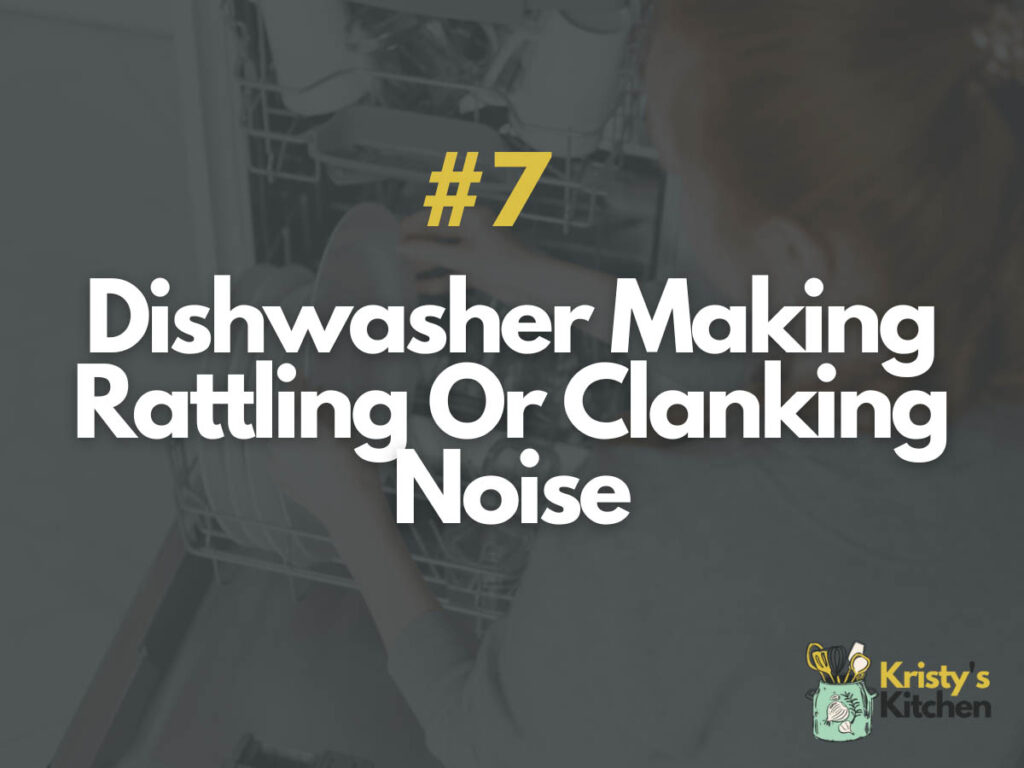
Rattling or clanking noises can occur when items inside the dishwasher move around during the wash cycle.
It can also be caused by loose plumbing connections or malfunctioning components.
Step By Step Fix For Rattling and Clanking Noise
Here’s what to do:
- Open the dishwasher and check for any loose items, such as utensils or small dishes.
- Remove them to prevent further noise.
- Inspect the dishwasher’s plumbing connections and ensure they are securely fastened.
- Tighten any loose connections to minimize rattling or clanking sounds.
Other than these steps, there’s not much else you can do. If you still hear the noises, something inside the washer is likely broken and needs to be checked by a technician.
8. Dishwasher Making Gurgling or Sloshing Noise
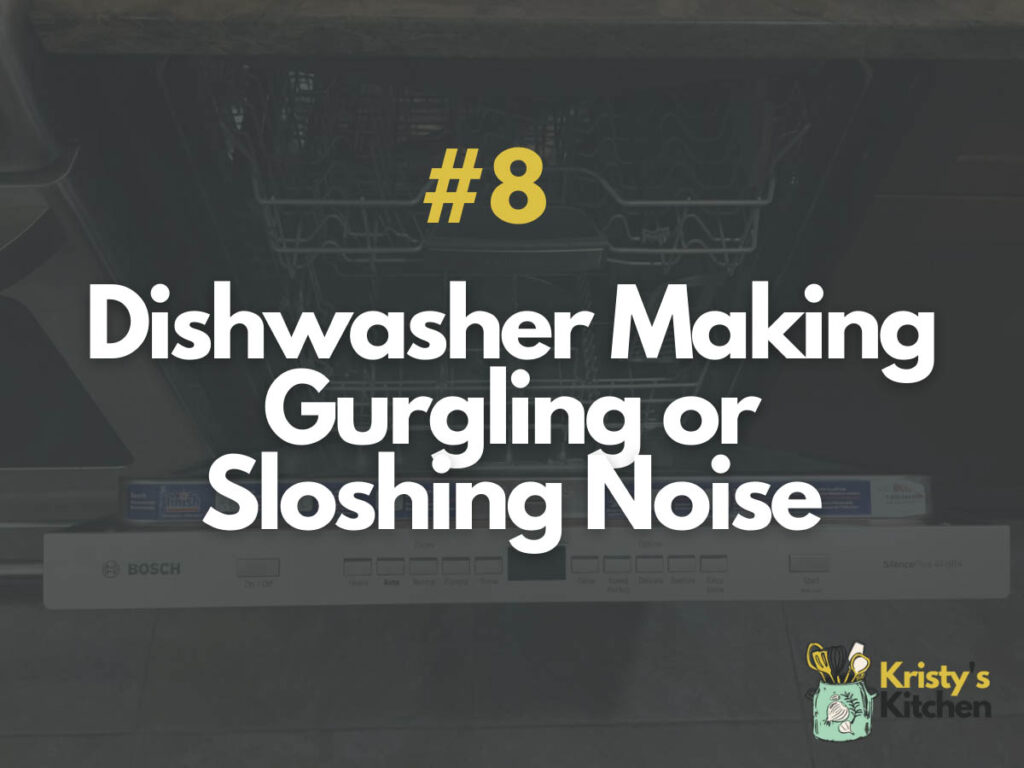
Gurgling or sloshing noises can occur when the dishwasher is draining or when air is trapped in the drain line.
Step By Step Fix For Gurgling And Sloshing Noise
You can eliminate the noise the following way:
- Check the dishwasher’s drain hose and ensure it is properly installed and not kinked or clogged.
- Straighten or clear any obstructions.
- Verify that the dishwasher’s drain is connected to a high loop or an air gap to prevent backflow and trapped air.
- If the gurgling or sloshing noise persists, there may be an issue with the drain pump or the drain line.
- Consider consulting a professional technician for further inspection and repair, especially if the dishwasher is not draining properly.
9. Dishwasher Making Whirring Or Swooshing Noise
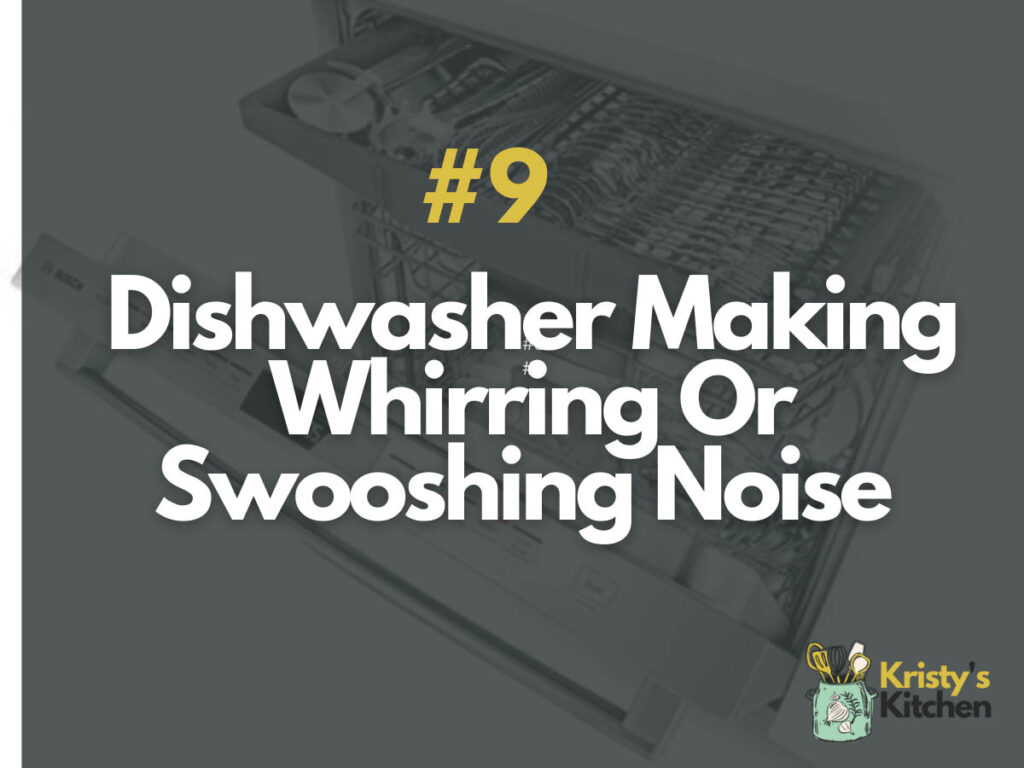
A whirring or swooshing noise is usually normal and can be heard when the dishwasher is running, especially during the water circulation and spraying process.
It’s a regular part of the dishwasher’s functioning and not something you should be bothered about.
Dangers Of Not Repairing A Noisy Bosch Dishwasher
Ignoring a noisy Bosch dishwasher can lead to several potential dangers and inconveniences:
- Inefficient Cleaning: A noisy dishwasher may not clean your dishes properly, leaving them dirty or partially cleaned.
- Damage to Dishes and Utensils: Unresolved noise issues can cause items inside the dishwasher to clash or bang against each other, resulting in chipped or cracked dishes and utensils.
- Water Leaks: Faulty components in the dishwasher, indicated by noise issues, can lead to water leaks during operation, potentially damaging your kitchen floor and cabinets.
- Higher Energy Bills: A malfunctioning dishwasher may consume more energy, increasing your energy bills.
- Potential Fire Hazard: In very rare cases, certain noise problems can indicate an electrical issue, increasing the risk of a fire hazard.
To avoid these, always keep an ear out for your dishwasher and remember what’s normal and what isn’t.
Get the appliance checked as soon as you notice something out of place.
Tips To Prevent Noise Issues In Bosch Dishwasher
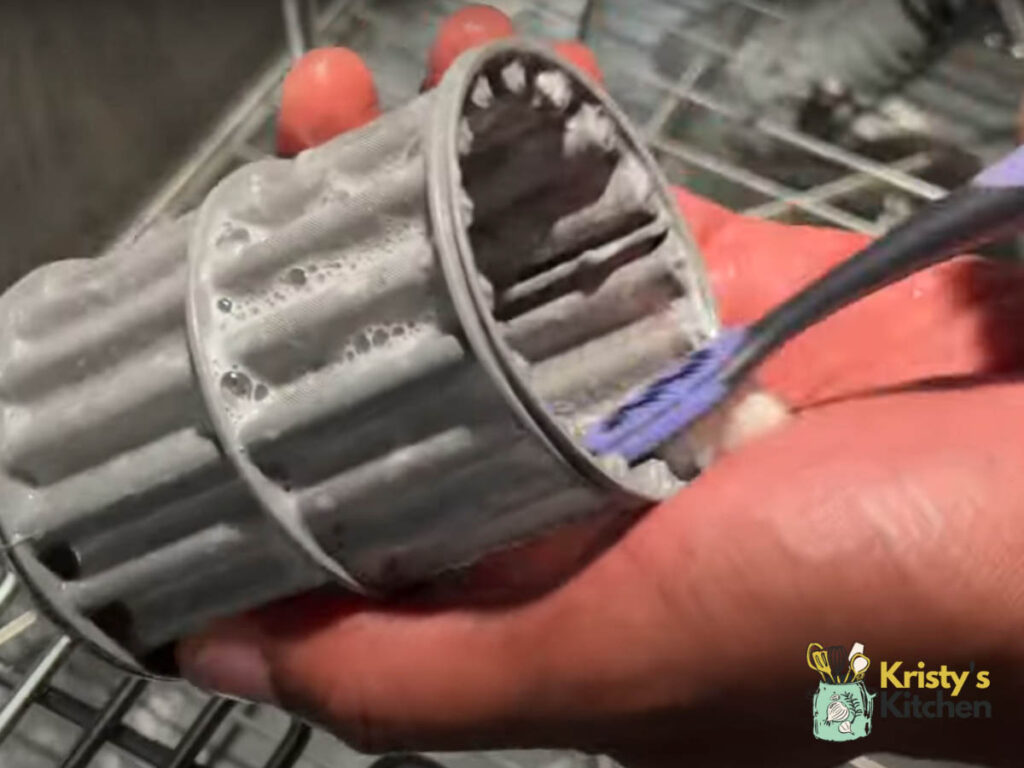
To prevent noise issues in your Bosch dishwasher, follow these simple tips:
- Load dishes properly to prevent them from clashing during the wash cycle.
- Keep the spray arms, filters, and drain clean to ensure smooth water flow.
- Adjust the dishwasher leveling feet to reduce vibrations and movement.
- Avoid overloading the dishwasher, as it can cause noisy operation and poor cleaning.
By following these tips, you can minimize noise-related problems in your Bosch dishwasher.
FAQs
What is the normal noise level of bosch dishwashers?
Newer Bosch dishwashers typically operate at a noise level of around 44-48 decibels, similar to a quiet conversation or light rainfall.
How do I know if my Bosch dishwasher pump is bad?
Signs of a faulty pump include unusual noises like grinding or buzzing during operation, improper water drainage, or inadequate dish cleaning.
How much does it cost to replace a pump on a Bosch dishwasher?
The cost of replacing a pump in a Bosch dishwasher can vary based on factors such as the model and technician’s charges. On average, it ranges from $150 to $300, including parts and labor.
Which models of Bosch dishwashers are more prone to noise issues?
While noise issues can occur in any dishwasher model, older Bosch dishwasher models may be more susceptible due to wear and tear. Newer models often have advanced insulation and noise reduction features.
Final Thoughts
So, what are you waiting for? Try out these solutions – you’ll find exactly what you need among them.
And even if the noise you’re getting is supposed to be normal, I’ve still added a couple of tips to help reduce it.
Don’t let the noise from your Bosch dishwasher dampen your kitchen experience.
Go get that dishwasher back in working order so you can enjoy having your dishes scrubbed for you in peace.
